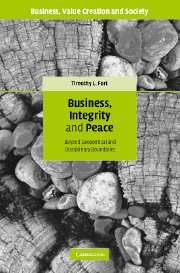6 - Real Trust
Published online by Cambridge University Press: 19 January 2010
Summary
Real Trust is probably what most people think of when they hear the term trust, at least in business. Real Trust is about people living up to the promises they made, being honest, producing products and services that are of high enough quality to satisfy customers, and rewarding people for doing the things the company says are important. Real Trust is “real” because there is an inherent efficacy about it. Real Trust “pays” because there is an alignment of rhetoric and reward. Real Trust is about how good ethics is good business, usually with a long-term perspective. This suggests a combination of normative and descriptive. LaRue Hosmer once wrote that trust was the connecting link between organizational theory and normative business ethics. There are moral understandings of what business should do and there is some empirical assessment of exactly how it has economic benefit. Real Trust is positioned between Hard Trust and Good Trust. An important way to generate Real Trust is for a company to implement a compliance program that is fair, consistent, and with buy-in. Thus, Real Trust can build on Hard Trust. On the other end of the spectrum, Good Trust is about engaging the passions and the human desire to do good. One way for a company to generate Real Trust is to engage those passions. And so, there is overlap between the three kinds of trust.
- Type
- Chapter
- Information
- Business, Integrity, and PeaceBeyond Geopolitical and Disciplinary Boundaries, pp. 165 - 198Publisher: Cambridge University PressPrint publication year: 2007



